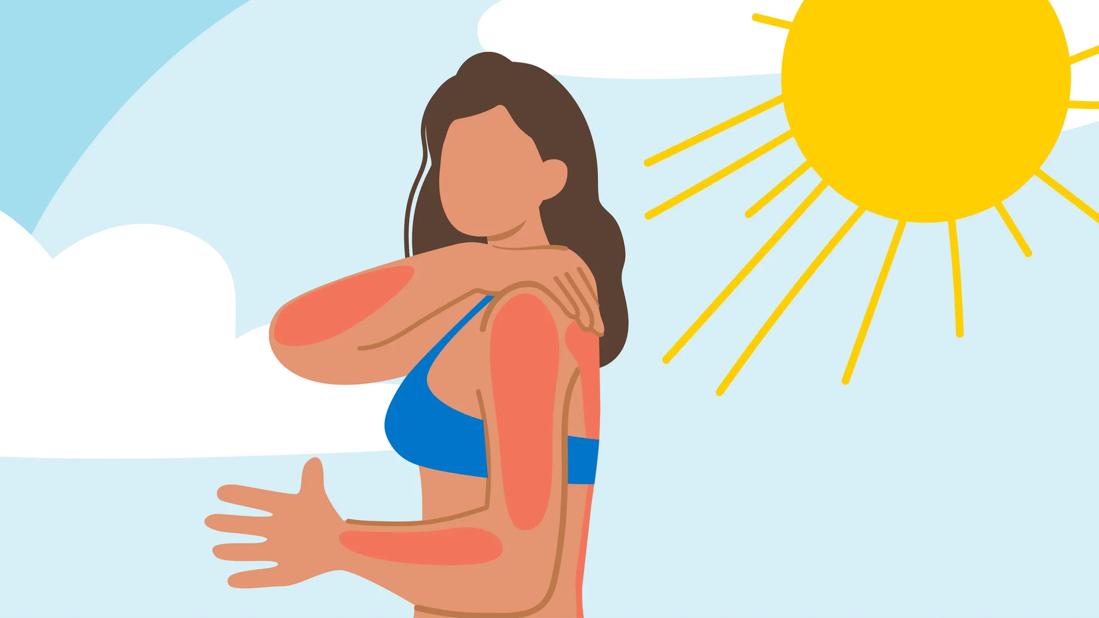A cool shower, aloe vera gel, anti-itch treatments and cool compresses can provide fast sunburn relief

When a sunburn strikes, you want relief fast. If you’re feeling nauseated, dehydrated or dizzy, seek emergency care — these are common signs of sun poisoning and require more immediate attention. But if you’ve got a mild sunburn that’s red and painful, you can typically treat it at home with a few remedies and over-the-counter products.
Advertisement
Cleveland Clinic is a non-profit academic medical center. Advertising on our site helps support our mission. We do not endorse non-Cleveland Clinic products or services. Policy
While recovering from your sunburn, you want to:
Instead, dermatologist Melissa Piliang, MD, suggests these eight strategies for soothing sunburns and relieving pain.
When you’ve got a sunburn that feels like it’s on fire, it’s best to throw some water on it.
“Take a cool bath or shower to bring the temperature of your skin down,” advises Dr. Piliang. This helps reduce inflammation. But make it short — spending too much time in the water can dry out your skin.
If you’re showering, keep the water pressure gentle to avoid additional pain.
After you cool down with some water, it’s a good idea to lock in that moisture. While your skin is still wet, apply a moisturizing cream or lotion. You should also apply it frequently in the first few days after the initial sunburn to limit any dryness and speed up the healing process.
The green gel that comes from an aloe vera plant can help soothe and cool down your sunburn. Because of its anti-inflammatory properties, aloe vera helps calm your skin and relieve any stinging or discomfort.
Advertisement
It’s just a temporary fix — but hey, whatever soothes the burn until it heals! Just be sure to go for pure aloe vera gel (straight from the plant) or store-bought gel that doesn’t have any added irritants or fragrances.
Sometimes, the itching from a sunburn can be as irritating as the burn itself (if not more). But there are ways to alleviate that, too.
Whatever you do, don’t scratch it — doing so opens up your risk for infection, more inflammation and pain. If you’re feeling itchy, try applying a thin layer of 1% hydrocortisone cream to the sunburned area instead.
If your burn only affects a smaller area, you can cool it down using a cold compress, like a wet towel or washcloth. But don’t use an ice pack directly on the burn. While it may seem like a good idea to fight extreme heat with extreme cold, ice can actually give you frostnip and cause further damage to your sunburned skin and the surrounding tissues.
“Cool compresses feel great and provide some relief from the burning sensation,” Dr. Piliang notes. “Just gently place it on the burn until your skin feels cooler to the touch.”
If after trying other strategies, you’re still feeling pain and irritation from your sunburn, over-the-counter pain medication can provide temporary relief.
“You can take something for the inflammation, like ibuprofen, naproxen or aspirin,” Dr. Piliang recommends.
Sunburns draw fluid away from other parts of your body to your skin. This process can quickly leave you dehydrated. So, make sure you’re drinking more water than you usually do.
“It’s really important to make sure you’re hydrating well,” Dr. Piliang stresses. “Drink a lot of water. Sports drinks that replenish your electrolytes can also help.”
Friction is the last thing you want when you’re dealing with a sunburn. When possible, try not to cause any further irritation to your sunburned skin.
Wearing loose-fitting clothing that’s soft, light and breathable can help make sure your skin doesn’t feel like it’s under attack by a cheese grater.
Sunburns usually go away on their own within a couple of days. More severe sunburns could last up to a couple of weeks. While your skin heals, focus on staying cool, reducing your pain and limiting irritation.
Sometimes, at-home remedies for sunburns aren’t enough. If you notice your sunburn isn’t healing, don’t avoid the issue. Seeking medical care is also important if you’re:
Advertisement
“Sunburns can cause serious illness and they can easily get infected if you’re not careful,” warns Dr. Piliang. “If you’re experiencing any of these symptoms or your sunburn isn’t relieved in a few days or weeks, make an appointment with your primary care provider.”
Advertisement
Learn more about our editorial process.
Advertisement

Several conditions, like vitiligo and fungal infection, can cause a loss of pigmentation, leading to white spots or patches on your skin

This cooling gel can help soothe sunburned skin, but it can’t cure the burn

You know it’s not good if you’ve been holding onto it for more than three years or if it’s changed in color, consistency or smell

Look for a UPF rating of 50+ for optimal protection against UV rays

A sunburn will leave you itchy and red, while sun poisoning can feel like an allergic reaction

SPF stands for ‘sun protection factor’ — it’s a measure of how much protection you’re getting before a sunburn is possible

This ‘poisoning’ is actually a severe sunburn that seems similar to an allergic reaction

When outside, protect your skin from damaging UV rays with a fresh layer of sunscreen at least once every two hours

Wearing a scarf, adjusting your outdoor activities and following your asthma treatment plan can help limit breathing problems

Your diet in the weeks, days and hours ahead of your race can power you to the finish line

When someone guilt trips you, they’re using emotionally manipulative behavior to try to get you to act a certain way